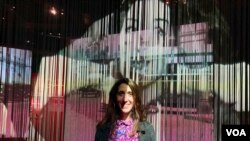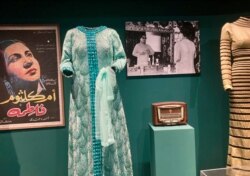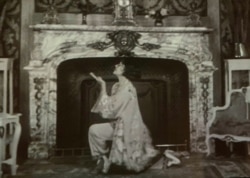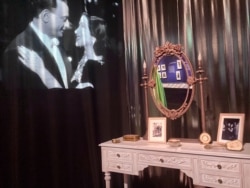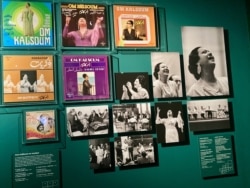The golden age of Arab cinema and music of the 20th century is being revisited through its female stars — women who became powerful symbols of feminism, Arab independence and identity.
Through film and music clips, posters and mementos, a Divas exhibit in Paris traces the Arab world's female artistic scene from the 1920s to the '70s. It includes singers like Egypt's legendary Oum Kalthoum, and Fayrouz from Lebanon. Actresses like Souad Hosni and Hind Rostom. Also, dancers, producers and directors. Those stars, and the times they lived in, embodied much more than art.
"Women in the Arabic world fought to live their life, fought to obtain more rights and it was a woman fight — women for women," said Elodie Bouffard, co-curator of the exhibit at the Arab World Institute.
"This exhibition is just to say, 'At this time, this industry was very strong and was an industry where women had their place.'"
The exhibit runs through September 26 at the Arab World Institute in Paris.
Few stars occupied such a big place — or left such a big hole — as Egypt's Oum Kalthoum. She remains arguably the Arab world's greatest singer, whose albums sold by the millions. She was also an actress and songwriter. Like many of the exhibit's divas, she came from a humble background.
"She was the little poor Egyptian woman from the Delta of the Nile," said Bouffard. "And because she was a great singer, she had the opportunity to go to Cairo. And she completely understood that she had to accept a metamorphosis to live her life, because her daddy was an imam. So, when she was in Cairo, she asked Daddy to come back in the Delta and she said, 'Don't worry, I will give you some money. You can have a great life but let me … become what I want to become.'"
Oum Kalthoum sang in support of Egypt's nationalist leader Gamal Abdel Nasser. In Lebanon, Christian singer Fayrouz, now in her 80s, is known for her fierce love of her country and Arab identity.
"She sings for Jerusalem, but she can just make her song for the Haj, the pilgrimage to Mecca, for the Muslims," Bouffard said. "She just goes through religious identity to embody the pride to be an Arab."
Other Arab stars broke different kinds of ground. French-born Warda championed Algeria's fight for independence from France. She later divorced to pursue her singing career. Syrian singer Asmahan smoke, drank and had lovers — and allegedly was a World War II spy.
There was also Egyptian-born Dalida, who became a major hit in France.
Zahira, a visitor to the exhibit, found inspiration there.
"It's really, really impressive to see that the Arab world had many women pioneers, who were really powerful women, who knew what they wanted, who were producers as well as spouses, and they were beautiful women that really make the Arab world proud of them," Zahira said.
Another visitor, Joelle Busche, says she wanted to see the exhibit because she's interested in Middle East culture — and because it's about women.
The show begins with the early Arab stars — those Bouffard calls the "forgotten divas."
"They were the first to go on stage, they were the first producer, the first actress(es)," Bouffard said. "The first feminist to go on the street and say, 'We want more rights!'"
These 20th century divas can appear to clash with a more conservative Arab society today — at least by Western standards.
Still, Bouffard believes female Arab artists are finding new ways to express themselves — just as they did in the past.




